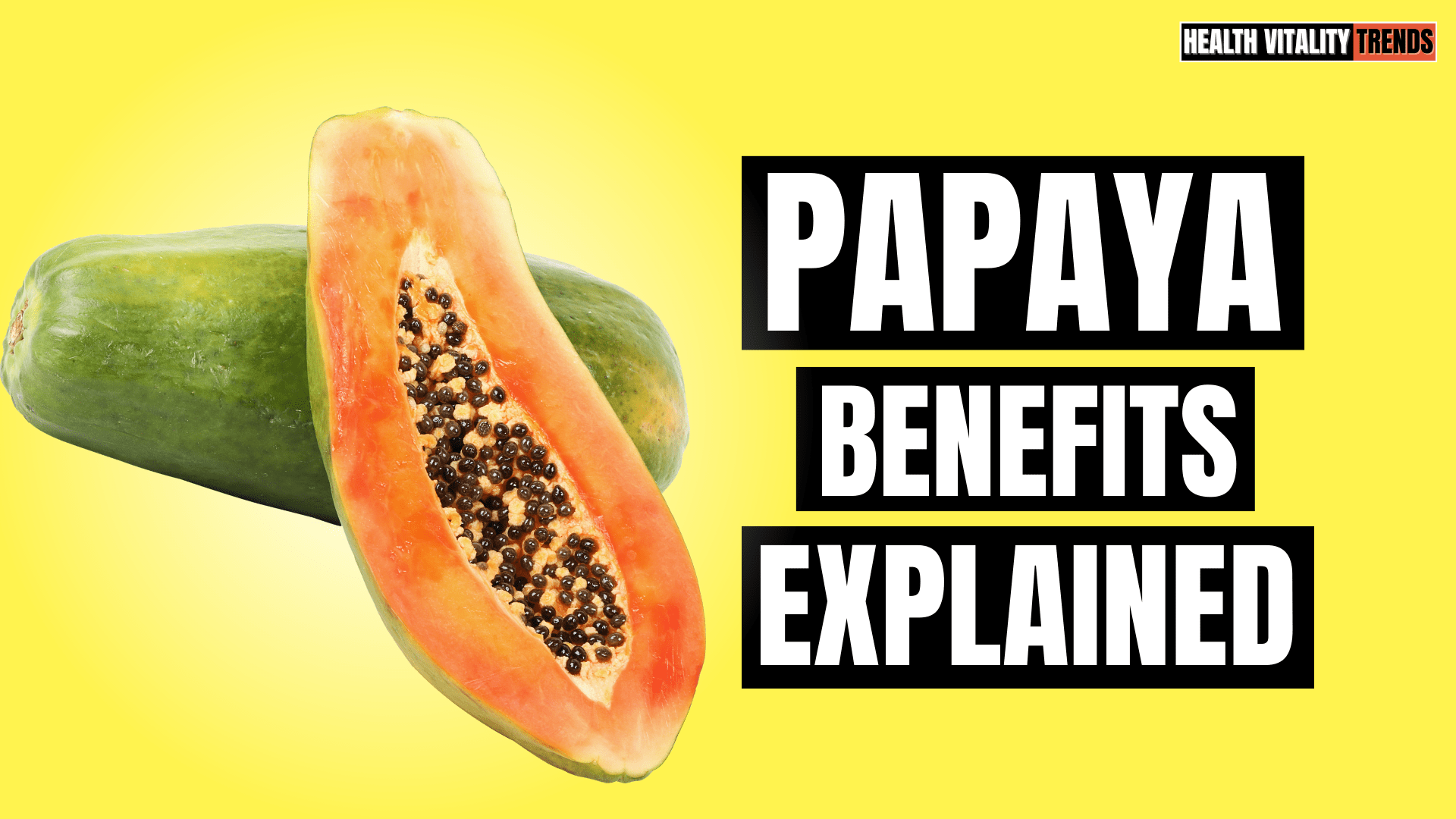
PAPAYA: Nutrition, Benefits and How to Eat It
Sweet, vibrant, and packed with nutrients, Papaya is a tropical fruit celebrated for its digestive and healing properties.
It is rich in vitamin C, antioxidants, and digestive enzymes. And it has also been valued in traditional medicine and modern nutrition alike.
From boosting immunity to aiding digestion, papaya offers benefits for both short-term wellness and long-term health.
Let’s explore what makes papaya so special! Its nutritional profile and what are the best ways to enjoy it.
What is Papaya?
Papaya (Carica papaya) is a tropical fruit native to Central America. It is cultivated in many warm regions worldwide, including India, the Philippines, and Africa.
The papaya fruit has an elongated shape, greenish skin when it’s unripe, and has a vibrant orange flesh with black edible seeds when ripe.
Moreover, it is also known as the “fruit of angels” by Christopher Columbus. Papaya is widely used in both culinary and medicinal traditions for its health-promoting properties.

What Does Papaya Taste Like?
When eating a ripe papaya, it has a soft, buttery texture with a sweet, musky flavor, often similar to cantaloupe or mango.
Unripe papaya (with its outer green skin), on the other hand, has a mild, less sweet taste and is commonly used in savory dishes such as Thai green papaya salad.
Although the seeds are commonly not consumed, they have a peppery, slightly bitter flavor and are sometimes used as a spice alternative.
Papaya Nutrition Facts
Here’s the nutritional profile of 1 cup of raw ripe papaya (about 145 g), based on USDA [1] data:
| Nutrient | Amount |
|---|---|
| Calories | 62 kcal |
| Carbohydrates | 16 g |
| Dietary Fiber | 2.5 g |
| Sugars | 11 g |
| Protein | 0.7 g |
| Fat | 0.4 g |
| Vitamin C | 88 mg (98% DV) |
| Vitamin A | 1,530 IU (31% DV) |
| Folate (B9) | 53 mcg (13% DV) |
| Potassium | 264 mg (8% DV) |
| Magnesium | 30 mg (7% DV) |
| Water Content | ~89% |
Explanation: Papaya is a low-calorie fruit, yet it is rich in vitamin C, vitamin A (as beta-carotene), folate, and antioxidants. It also contains papain, which is a unique digestive enzyme that helps break down proteins, making it popular for improving digestion.
Health Benefits of Papaya
1. Supports Digestion – Papain, the enzyme in papaya, helps to break down protein and may reduce symptoms of bloating and indigestion (PubMed) [2].
2. Boosts Immunity – With nearly 100% of the daily vitamin C requirement per cup, papaya strengthens the immune system and protects against infections (NIH) [3].
3. Promotes Heart Health – Rich in antioxidants, potassium, and fiber, papaya supports healthy blood pressure and may lower cholesterol levels (NIH) [4].
4. Aids Eye Health – Beta-carotene and vitamin A protect vision and reduce the risk of age-related macular degeneration, making papaya the best fruit for seniors with poor eyesight.
5. Anti-Inflammatory Properties – Papaya’s antioxidants (lycopene, flavonoids) may help reduce chronic inflammation and oxidative stress.
6. Skin Health & Wound Healing – Vitamin C and A support collagen production, while papaya extracts are used in skincare for reducing acne scars and promoting skin repair.
How to Eat Papaya
- Fresh: Using a sharp knife, simply slice the ripe fruit into small pieces, remove seeds, and enjoy.
- Smoothies & Juices: Blend with banana, orange, or pineapple for a tropical mix.
- Salads: Use ripe papaya chunks in fruit salads or unripe green papaya in savory salads.
- Cooking: Unripe papaya is commonly stir-fried or added to stews in many Asian cuisines.
- Seeds: Can be dried and ground as a pepper substitute.
Fun Fact: In many parts of India, papaya is traditionally recommended for digestion after heavy meals, and its latex has been used in folk medicine to tenderize meat.
How to Store Papaya to Keep It Fresh
- Unripe Papaya: Leave at room temperature. If the skin turns yellow-orange, that menas it is now ripe and ready to eat.
- Ripe Papaya: Store in the refrigerator; lasts 3–4 days once cut.
- Chopped Papaya: Keep in an airtight container, preferably with a squeeze of lemon to preserve freshness.
- Avoid Overripening: Keep away from ethylene-producing fruits like bananas.

Possible Side Effects and Precautions
Side Effects
- Digestive Upset – Excessive consumption may cause diarrhea due to high fiber and papain.
- Allergic Reactions – Some people may be allergic to papain or latex, leading to itching or swelling (PubMed) [5].
- Pregnancy Concerns – Unripe papaya contains latex, which may trigger uterine contractions.
- Excess Vitamin C – Overeating may cause mild nausea or a risk of kidney stones in sensitive individuals.
Precautions
- Medication Interactions: Papaya supplements may interact with blood-thinning medications like warfarin.
- Pregnant Women: Avoid unripe or semi-ripe papaya.
- Latex Allergy: People allergic to latex should be cautious with papaya and papain supplements.
- Diabetics: While papaya has a low glycemic index, portion control is important.
Fruits Similar to Papaya
- Mango – Sweet, tropical fruit with similar antioxidant content.
- Cantaloupe – Comparable in texture and vitamin A content.
- Pawpaw (Asimina triloba) – Sometimes confused with papaya, though they are different species.
- Jackfruit – A larger tropical fruit, with a similar fibrous texture in ripe form.
Common FAQs About Papaya
Q1: Can I eat papaya every day?
Yes. Eating a cup of ripe papaya daily is safe and beneficial for most people.
Q2: Is papaya good for weight loss?
Yes. Low in calories and high in fiber, papaya helps with satiety and digestion, making it supportive of weight management.
Q3: Can I eat papaya at night?
Yes. Papaya’s digestive enzymes may even help with overnight digestion, though sensitive individuals should avoid eating it too close to bedtime.
Q4: Are papaya seeds edible?
Yes, in small amounts. They have a peppery flavor and contain beneficial compounds but should not be consumed in excess.
Conclusion
Papaya is a powerhouse tropical fruit with impressive nutritional and medicinal benefits. From aiding digestion to boosting immunity and supporting heart and skin health, it truly lives up to its reputation as the “fruit of angels.” Enjoyed fresh, in smoothies, or in savory dishes, papaya is a versatile and healthy addition to any diet.
References
- https://fdc.nal.usda.gov/food-details/169926/nutrients
- https://pubmed.ncbi.nlm.nih.gov/23524622/#:~:text=Conclusion:%20We%20conclude%20from%20these,tract%20physiology%20support%20is%20discussed.
- https://pmc.ncbi.nlm.nih.gov/articles/PMC11861161/#sec9-viruses-17-00271
- https://pmc.ncbi.nlm.nih.gov/articles/PMC8631183/#s0006
- https://pmc.ncbi.nlm.nih.gov/articles/PMC6016011/#sec17




